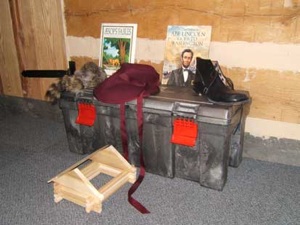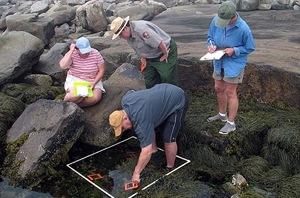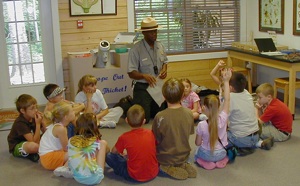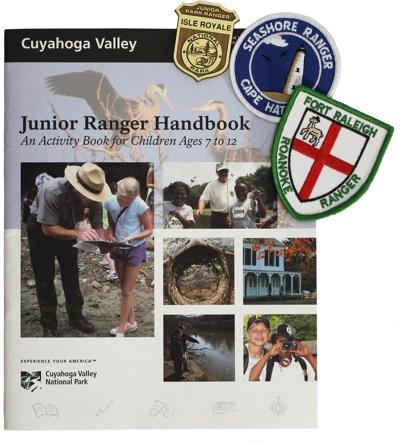When one thinks of national parks, visions of natural scenery at places such as Mount Rushmore, Old Faithful at Yellowstone, and El Capitan at Yosemite come to mind. Perhaps the furthest thing from a person’s mind is a vision of a classroom; but the fact is that national parks and historic sites are a perfect environment for visitors of all ages to learn.
The national parks offer many educational interpretive programs, ranger–led tours, and exhibits pertaining to the primary themes of the park. There are also specialized programs available for children, including the Junior Ranger Program, in which kids complete a workbook filled with educational games, puzzles and activities. Upon completion, they receive a ‘Junior Ranger Badge’ and are dubbed an honorary park ranger. Programs like this engage kids and motivate them to learn more about the site they are visiting.
But how do we engage kids to learn about the national parks inside the classroom?
Curriculum requirements vary from state to state, but most children are taught about the national parks in fifth and sixth grades. The National Park Service has free curriculum resources available for teachers on its website, and these valuable tools can easily be downloaded and implemented to enhance teachers’ lesson plans. Field trip planning resources are available for teachers planning a class visit to a park.
At the National Education Association trade show, we asked an elementary school teacher from central Wisconsin how she teaches her students about the parks.
She responded that she asks her kids to pick a park, and write a report about it.
“Would you be inclined to take the kids on a field trip to a park?” we asked.
“I would love that,” she replied. “It’s just that there are no national parks located near us that we could visit.”
Other challenges that teachers face with visiting national parks for class field trips involve economics. According to an elementary school teacher from Arkansas, field trips are a thing of the past in her school district.
“The district just does not have the resources to cover liability insurance or transportation, nor do we have enough staff available to accompany the students,” she said.
Travelling Trunk and the Guest Speaker Programs
Although some students might not have the opportunity to visit a park via a field trip, the NPS can “bring the park to the classroom,” by way of several programs. One of these is through a virtual field trip, where students can learn about parks through an internet-based program and through audio and video conferencing technology. The NPS will also loan materials to schools, such as videos and other multimedia, depending on geographical areas and availability.

"Travelling Trunk" programs are a popular way to help students learn about history and the national parks. NPS photo.
The “Travelling Trunk” and “Guest Speaker” programs bring a park ranger and assorted learning materials to a school for a more hands-on experience. These programs are ideal for schools that do not permit field trips, and they literally bring the park into the classroom. They also give students the opportunity to interact with a park ranger, just as they would if they were visiting a park.
Professional Development Programs
According to the NPS website, more than 70 parks offer professional development programs for teachers, programs that range from simple workshops (accredited and eligible for college credits), to institutes and field schools, which can last as long as 30 days. Many of these field schools are a cooperative effort between nonprofit groups, universities, and the NPS, and have programs available not just for teachers, but also for senior citizens and kids.
The Tsongas Industrial History Center, in cooperation with the University of Massachusetts and Lowell NHP, offers teachers and schools a resource for historical content, interdisciplinary teaching approaches for history, science, language arts, mathematics, recertification points, and for curriculum planning. All workshops are participatory and provide teachers with useful teaching materials and activities.
The Independence Park Institute (IPI), the educational branch of Independence NHP, is a partnership between the NPS, Eastern National and the William Penn Foundation.
“The Professional Development Programs of the Independence Park Institute are designed to give educators content knowledge and to help them apply that knowledge in the classroom. We address different learning styles, teaching across the curriculum, and hands-on active learning using the resources of Independence NHP. We stress the use of primary sources, objects, and place-based education,” according to Jeffrey Collins, Education Program Manager at the IPI.
A wide range of professional development programs are available for teachers at the IPI, which help teachers to plan field trips and develop curriculum . For example, a special workshop is being offered to teachers this July in partnership with Valley Forge NHP, which will explore how the economic, social and political foundations of American history can spark the approach to teaching social studies.

Teachers get hands-on lessons working with rangers at the Schoodic Education and Research Center. NPS photo.
At Acadia National Park, the Schoodic Education and Research Center (SERC) provides Advanced Placement summer institutes in biology, environmental science, statistics, chemistry, world history, and art. The park provides a unique setting for intense work with other teachers and institute instructors, and there are accommodations for participating teachers on the SERC campus at Schoodic Point, surrounded by the pristine landscape of Acadia.
Teacher-Ranger-Teacher Program
Another tremendous opportunity for teachers to enrich their national parks curriculum is through the NPS’s “Teacher-Ranger-Teacher” program, where teachers become park rangers for the summer and interact with park visitors. This program has proven to be enormously successful for teachers and parks alike, where the experience of working at a park enhances a teacher’s knowledge, and the park benefits from the experience of a teacher.

Ranger Will Watkins from Big Thicket National Preserve educates students on the preserve. NPS photo.
Saratoga NHP participated in the Teacher-Ranger-Teacher program last summer, and brought in Joe Crocetta, an eighth grade social studies teacher from the Catskill Central School District, an underprivileged school district in Greene County, New York. His contributions have had lasting results on the park.
“Joe assisted Saratoga NHP’s interpretive division with testing a daylong immersion program, where middle school students spend 24 hours experiencing life in the 18th century, as soldiers of the Continental Army. He also assisted interpreters in developing pre-visit and post-visit activities for future student visitors,” commented Bill Valosin, park ranger at Saratoga NHP. “Joe will bring the park to his students during National Park Week, where he will wear his NPS uniform in class, and encourage his students to learn more about the many opportunities in national parks for learning, recreation, and even careers.”
Joe Crocetta’s experiences working at Saratoga NHP have had an equally lasting impact on him.
“The Teacher-Ranger-Teacher program has provided me with a wealth of information to share with my students,” he said. In May of 2012, his class will have the opportunity to participate in the new immersion program. “The rangers’ commitment to the program has made it a great success and an experience that students will never forget.”
Learn more about professional development and educational opportunities at this National Park Service site.




Add comment